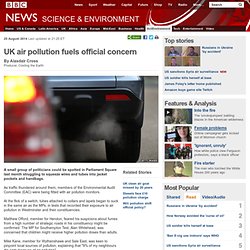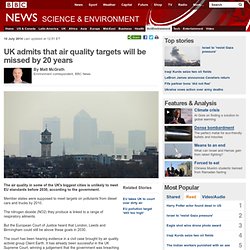

Germany 'pollution spike' follows New Year's Eve fireworks [03/01/17] Dementia rates 'higher near busy roads' [05/01/17] Image copyright EPA People who live near major roads have higher rates of dementia, research published in the Lancet suggests.
![Dementia rates 'higher near busy roads' [05/01/17]](http://cdn.pearltrees.com/s/pic/th/dementia-rates-higher-roads-145366642)
As many as 11% of dementia cases in people living within 50m of a major road could be down to traffic, the study suggests. The researchers, who followed nearly 2m people in Canada over 11 years, say air pollution or noisy traffic could be contributing to the brain's decline. UK dementia experts said the findings needed probing but were "plausible". Nearly 50 million people around the world have dementia. However, the causes of the disease, that robs people of their memories and brain power, are not understood.
Population growth There were 243,611 cases of dementia diagnosed during that time, but the risk was greatest in those living closest to major roads. Compared with those living 300m away from a major road the risk was: 7% higher within 50m4% higher between 50-100m2% higher between 101-200m. UK air pollution fuels official concern. 25 August 2014Last updated at 21:25 ET By Alasdair Cross Producer, Costing the Earth A small group of politicians could be spotted in Parliament Square last month struggling to squeeze wires and tubes into jacket pockets and handbags.

As traffic thundered around them, members of the Environmental Audit Committee (EAC) were being fitted with air pollution monitors. At the flick of a switch, tubes attached to collars and lapels began to suck in the same air as the MPs, in tests that recorded their exposure to air pollution in Westminster and their constituencies. Matthew Offord, member for Hendon, feared his suspicions about fumes from a high number of strategic roads in his constituency might be confirmed. The MP for Southampton Test, Alan Whitehead, was concerned that children might receive higher pollution doses than adults. Stark mortality figures like these have convinced the EAC members to launch an investigation into the slow progress being made in improving air quality in the UK. Students monitor parents' air pollution.
UK admits that air quality targets will be missed by 20 years. 10 July 2014Last updated at 12:51 ET By Matt McGrath Environment correspondent, BBC News The air quality in some of the UK's biggest cities is unlikely to meet EU standards before 2030, according to the government.

Member states were supposed to meet targets on pollutants from diesel cars and trucks by 2010. The nitrogen dioxide (NO2) they produce is linked to a range of respiratory ailments. But the European Court of Justice heard that London, Leeds and Birmingham could still be above these goals in 2030. The court has been hearing evidence in a civil case brought by air quality activist group Client Earth. The European case arose because the UK judges asked their European colleagues for a precise meaning of certain provisions of the EU air quality directive.
Confusion in court Until today, the government had said that all parts of the UK would be in compliance by 2025. Lawyers for Client Earth pointed out that the new information had been posted on Defra's website the evening before. Hong Kong Air Pollution Hits Record High for 2013. Hong Kong recorded its worst day of the year for air pollution on Monday.

Residents were advised to stay indoors and limit physical exercise. Two roadside monitoring stations in Mong Kok and Central recorded pollution indexes at “severe” levels of 205 and 210, respectively. Half a dozen stations in areas with less traffic recorded “very high” levels between 103 and 140. The high pollution readings were reportedly caused by a lack of airflow around Hong Kong’s skyscrapers.
The trapped pollutants covered the harbor in smog, and Hong Kong Island’s skyline was barely visible from Kowloon. English teacher Lee Faulkner decided it was a good day to wear a facemask. [Lee Faulkner, English Teacher]: “The reason I'm wearing it is because the pollution here in Hong Kong it dreadful today. Over the past few years, many Hong Kong residents have been concerned about the effect of poor air quality on health and business opportunities.
A local business owner says the pollution is becoming a bigger problem.